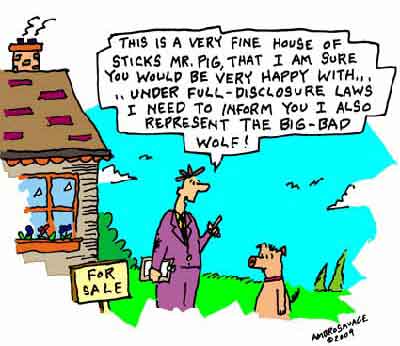|
Cartoons of
Dan McConnell
featuring
Tiny the Worm
Cartoons of
David Logan
The People's Comic
Cartoons of
John Jonik
Inking Truth to Power
|
Support the WA Free Press. Community journalism needs your readership and support. Please subscribe and/or donate.
posted Sept 24, 2009

When WA homebuyers get shafted, what response do they get from a monster real estate firm and from state regulators?
‘So Sue Us’
by Mark & Carol DeCoursey
Is Washington a consumer-friendly state? Or do government watchdogs work with predators to help them evade our laws? Learn about some local history and decide for yourself.
Newcomers to Washington in 2004, we were looking for a house and put our trust in a licensed real estate agent. As a former real estate agent myself, we knew that state licensure imposes a public trust and fiduciary duties. By statute, a Washington real estate agent is obliged to exercise reasonable skill and care and to deal honestly and in good faith. The agent must be loyal to the buyer by taking no action that is adverse or detrimental to the buyer’s interest, and must disclose to the buyer any conflicts of interest.
The agent we selected was recommended and experienced. He had worked for years for one of the largest real estate firms in the Northwest.
In 2004, this agent helped us buy a home, but without revealing some critical conflicts of interest. These conflicts of interest resulted in our losing hundreds of thousands of dollars.
The short story is that our agent set us up with a renovation package for the house he sold us in the city of Redmond, but he did not reveal that he was a shareholder and officer of the renovation company (which has since gone out of business). He also didn’t reveal that the same company was not licensed or insured according to state law. It was a betrayal of fiduciary trust. The results? The renovations were a disaster. Structural damage was done. Our home does not meet construction code, and we cannot obtain an occupancy permit. We cannot even sell it.
The upshot was that we became defendants, cross-claimants, and counter-claimants in a million dollar law suit which began on March 29, 2006 and is still not settled. In the process, we found many other cases of such betrayal that—in our opinion—point to a pattern of abuse by the real estate firm we used.
In July, 2006 we filed
a complaint with the Department of Licensing against the agent, his
brokers, and the agency. Among other things, we asserted that
the agent’s failure to disclose his conflicts of interest (as required
by Washington law RCW 18.86.050) had damaged us. We also charged
the agent, his brokers, and the agency with betrayal of fiduciary trust
and violation of the Consumer Protection Act.
Ten months later (and before the matter went to trial), Sandra Spencer, Investigations Manager of the Real Estate Unit of the Department of Licensing, wrote:
“After examination of the documents and information available to us, we have determined that the evidence does not rise to the level to support the issuance of charges against [the agent’s] real estate license... However, we reserve the right to reopen this file if a court of competent jurisdiction were to issue findings against any real estate licensees.”
We were surprised, and asked why DOL took no action. Spencer said the DOL did not have the resources to prosecute.

The DeCoursey house in Redmond, WA: five years and still no occupancy permit.
Seeing public policy issues, we wrote to the Senate Consumer Protection and Housing Committee. They showed no interest. We then discovered that our very own senator, Rodney Tom, had a seat on that committee. Tom, it turns out, was an associate broker for the same real estate firm, and had sold entire subdivisions for his builder clients. We publicly decried the Committee’s conflict of interest.
(In early 2009, the Consumer Protection and Housing Committee was disbanded. We now have the “Financial Institutions, Housing, and Insurance Committee,” and the “Labor, Commerce, and Consumer Protection Committee.” Sen. Tom does not have a seat on either committee.)
As we were pursuing our case, we discovered a similar one. An agent from the same firm had knowingly sold a rat-infested house in Shoreline to another newcomer to Washington. Victim Gary Kruger complained to DOL, but DOL similarly took no action against the agent, his broker, or the firm, despite undeniable documented proof.
Meanwhile, the firm’s lawyers made no serious offers to settle our lawsuit. Instead, they used “scorched earth” legal tactics, apparently betting that we’d run out of money before the trial and that our lawyers would abandon us, as happened to Kruger.
Despite the costs and risks, we went to trial in October 2008. The jury found that the agent’s undisclosed conflict of interest caused our damages and that he had violated the Consumer Protection Act. We were awarded $522,200. A few months later, the judge awarded us an additional $508,000 in costs and legal fees.
The firm, as you might
expect, is appealing the ruling.
Remembering DOL’s words, about a “court of competent jurisdiction,” we notified DOL of the court’s findings, in hopes that they would finally do something about our unethical agent. This time, Karen Jarvis, Program Manager of the Real Estate Regulatory and Enforcement Unit, wrote back. She had a new reason for not taking action. She told us DOL would take no action because “violation of the Consumer Protection Act is not a violation of the real estate licensing laws.”
We wondered how “unfair and deceptive practices” (to quote the Consumer Protection Act) could not be a violation of the Law of Real Estate.
At this point we were making other discoveries about the influence of the large firm we were fighting, such as the fact that the firm’s lead lawyer, who himself owned several franchises, helped rewrite Washington real estate law—at DOL’s invitation.
We eventually discovered
many other cases like ours. The firm used deceptive practices,
damaged customers, forced them to sue, and used “scorched earth”
legal tactics to ruin the customers or force them into submission before
trial. Whenever the firm lost at trial, it appealed, sometimes
all the way to the Supreme Court. This was a pattern of behavior.
The cases we found include these:
• Agents knowingly sold a meth lab house as a family residence without disclosing the home’s history. When the new owners heard about the drug history of the home, they called the Department of Health, who ordered the owners out of the house with only the clothes on their backs.
• An agent worked a foreclosure scam, in which a newly divorced and unemployed mother of a disabled child was eventually evicted from her home and the equity she’d built up was transferred to the agent.
• An agent, while representing both the seller and the buyer, forged a seller’s signature to one document and then the buyer’s signature to another, causing the buyer to sue the seller.
• Agents persuaded a mentally
confused old widow to give one of them power of attorney. They
then persuaded the widow to subdivide her 24 acres of waterfront view
property on Whidbey Island. They sold the lots to themselves and their
relatives at prices vastly below market. (The firm’s lead lawyer—who
rewrote our state’s real estate laws—owned this franchise.)
According to the DOL records available to the public, none of the above agents have been disciplined by the state, despite the court findings, as summarized here.
On December 28, 2008 we wrote to DOL Director Liz Luce and asked her how a jury’s findings that the firm had used “unfair and deceptive practices” could not be a violation of the real estate licensing laws. We cited trial and appeal court findings, DOL’s refusal to take action despite those findings, and other evidence that DOL was colluding with the firm to evade Washington real estate and consumer protection law.

WA State Attorney General Rob McKenna: nice smile, but not much help with unethical real estate practices
Luce didn’t reply, but forwarded our letter to Lee Malott, DOL’s Administrator of Real Estate Programs. We are still waiting for Mr. Malott to tell us how engaging in “unfair and deceptive practices” is not a violation of the law of real estate.
Gov. Christine Gregoire appointed Luce as Director of the Department of Licensing. Gregoire also appointed three agents of this firm to the Real Estate Commission. Surely she’d be interested in seeing how real estate law was being applied?
On May 28, 2009, we wrote to Gregoire, citing cases and showing evidence of DOL collusion with the firm.
Gregoire did not reply, but forwarded our letter to DOL to answer.
Think about that. When Elliot Ness received documented reports that Al Capone wasn’t paying his income taxes, did Ness turn the reports over to Capone so Capone could answer the charges?
Ralph Osgood, DOL’s Assistant Director of the Business and Professions Division, answered for Gregoire. He ignored the multiple court condemnations of the firm’s predatory practices and all evidence of DOL collusion. Instead, he focused on an issue we had not raised—and in the process contradicted the two previous excuses used by Spencer and Jarvis for taking no action in our case.
On June 15, 2009, we wrote to Attorney General Rob McKenna. McKenna boasts of his consumer protection advocacy and his war on meth. We cited ten documented cases of the firm’s predatory practices and charged that DOL was colluding to evade state law. We asked McKenna to take steps to compel DOL to enforce the law.
Assitant Attorney General Jody Lee Campbell responded on McKenna’s behalf. Without addressing any of the facts or the court findings, Campbell stated that the attorney general supported DOL’s decisions, and that if anyone challenged those decisions McKenna would defend DOL in court.
Astonished, we wrote back, asking how permitting this firm to knowingly sell a meth lab house without disclosure could advance McKenna’s war on meth or his consumer advocacy program. We also asked if the attorney general had counseled DOL not to take disciplinary actions in the meth lab case.
Campbell wrote back. She ignored our questions about McKenna’s war on meth and his consumer advocacy program, but said if we had complaints about real estate licensees to get in touch with DOL. She gave us the address and phone number.
And in answer to our question about the attorney general’s advice to DOL concerning the meth lab house, she stated:
“My role is to give the Department option-based advice, but any advice I give my client is subject to the attorney-client privilege.”
Option-based advice? This seems to imply that the DOL has the “option” to follow the law or not. Why would the attorney general’s office give them such an option?
OK, Washington.
Tell us about your liberalism and your consumer protection laws.
For more information, see Carol and Mark DeCoursey’s website, RenovationTrap.com.


